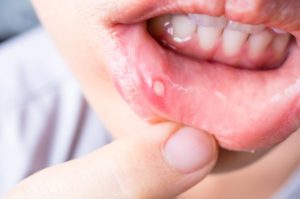 A canker sore is an ulcer that occurs in the mouth every once in a while. Also referred to as aphthous stomatitis in medical terms. It is a small ulcer that ranges from being mildly painful to very painful for some patients. Canker sores can be minor or significant in severity. Canker sores have a little yellow or white centre with a red border.
A canker sore is an ulcer that occurs in the mouth every once in a while. Also referred to as aphthous stomatitis in medical terms. It is a small ulcer that ranges from being mildly painful to very painful for some patients. Canker sores can be minor or significant in severity. Canker sores have a little yellow or white centre with a red border.
Minor Canker Sores: these are less than one in diameter and heal within a week or two.
Major Canker Sores: these are up to a half inch in diameter. The healing time is longer than a couple of weeks, and there is a chance of scarring after healing.
Unlike cold sores, canker sores are not contagious. Canker sores form on the inside of the mouth, whereas cold sores appear around the lips. Cold sores also affect the gums, tongue, and palates of the mouth. Canker sores should not be confused with thrush, which is a fungal infection that results in white spots on the tongue or inside the mouth, along with soreness and difficulty swallowing.
What Causes Them?
The primary cause is still unknown, but there some contributing factors have been identified. Some of those factors include:
- Injury to the mouth due to biting lips or cheeks
- Aggressive tooth brushing
- Spicy foods
- Acidic foods
- Hormonal changes
- Allergies to certain foods
- Viral Infections
- Genetics
- High stress or high anxiety
- Toothpaste and mouthrinses containing sodium lauryl sulfate
What Can You Try?
You may be able to alter the frequency that canker sores occur by avoiding or reducing foods that irritate your mouth. Examples of foods or drinks to avoid include, coffee, sour fruits, oranges, and chocolates. Avoid hard foods as well such as chips, nuts, pretzels, and crackers as well. Milk products, oily foods, and spicy foods should also be avoided.
Similarly, avoid foods that you know you are allergic to as well. Maintain good oral hygiene. Try to avoid injury to your mouth by chewing properly. Avoid placing things in your mouth to chew or bite on as a habit.
Some people have reported a reduction in pain by gargling with a salt water rinse. A mixture of hydrogen peroxide and water applied to the affected area helps for others as well.
Unconfirmed Home Remedies:
Baking Soda: Used to neutralize the acids that irritate a canker sore, as well as killing bacteria. Mix one teaspoon of baking soda with half a cup of warm water, and rinse.
Tea Tree Oil: It is vital to mix tea tree oil with water before use. Mix a quarter cup warm of water along with three to five drops of tea tree oil, then soak some cotton in the mixture. Place the soaked cotton on the sore for a few minutes. Repeat this a few times during the day.
Plum Juice: Placing a soaked cotton ball with plum juice on the sore for fifteen to twenty minutes or gargling with plum juice helps some patients.
Milk of Magnesia: Using a small amount of Milk of Magnesia to rinse the affected area helps neutralize acids in the mouth that cause stinging of the canker sore. Applying a little dab to the canker sore throughout the day also helps.
Tea Bags: Place a dampened tea bag against the canker sore for around five minutes. The compounds in tea help with pain relief.
Sage: Used to kill viruses, bacteria and reduce inflammation. Take two teaspoons of dried sage and steep in a cup of boiling water. Cover the cup, and let it cool. Use as a mouth rinse during the day, ensuring to make contact with the affected area.
Hydrogen Peroxide: A common disinfectant that is used to prevent the canker sore from infection. Rinse with hydrogen peroxide, or rinse with a mixture of hydrogen peroxide, water, salt and baking soda. Take care not to swallow any of the hydrogen peroxide.
Antacids: Antacids such as Pepto-Bismol or Tums help neutralize acids that irritate the sore. Try chewing on one of these antacids or placing it on the sore for a short period of relief.
Salt Water: While this remedy may seem strange, it works by drawing water out from tissues in the mouth through osmosis. This helps heal open wounds like canker sores. Rinse your mouth with a salt water mixture for about seconds for this remedy.
Aloe Vera: Helps to speed healing and offer relief. First, dry the affected area, then apply aloe gel to the sore. Also helpful for cold sores.
Vitamin E: Use the liquid version of vitamin E from an opened capsule on your canker sore to protect it from infection, and to speed up healing.
Onions: While this may be a bit of an uncomfortable solution, placing onions on the canker sore for ten to fifteen minutes will help relieve the pain, and help with healing. Remember to rinse your mouth out with water after removing the onions.
Coriander Leaves: Prepare a rinse by boiling two tablespoons of coriander leaves in a glass of water. Allow to cool until the temperature is lukewarm, then use as a rinse throughout the day.
Dental Considerations:
If you have a mouth sore that does not heal or go away after a week to two weeks, consult with your dentist or doctor. If you believe you have an infection, do not wait it out, contact us to get it checked out.
About Dr. Joseph Salvaggio

Located in Brampton, Ontario Dr. Joseph Salvaggio has been practicing general, cosmetic, and implant dentistry for over 20 years. He enjoys interacting with his patients and helping to restore their oral health for better overall health as well. Meeting new patients, interacting and educating them is one of Dr. Salvaggio’s biggest joys. We encourage you to read our reviews or call us with any dental questions you have. We look forward to speaking with you and meeting you soon.
